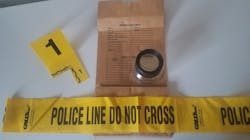Eye for Evidence: Don't Overlook Evidence
One challenge that I have seen in my career is the easy mistake of overlooking evidence. What does this mean and why can it be detrimental to an investigation?
Let's picture a typical, yet hectic scenario that officers and investigators encounter all of the time. Say you are executing a search warrant at a home that is suspected of being a location for drug use or drug distribution. Whether you have been in law enforcement a short time or a long time you will no doubt be involved in several of these types of investigations. These houses, as you know, are usually filled with junk, debris, trash, and tons of potential evidence. As you know, when you execute a search warrant once the residence is cleared and deemed safe, the search begins. In my experience as a crime scene investigator, I would photograph the entire house before the search warrant, then photograph evidence we decided to collect and lastly I would photograph the house at the end. When you are in the middle of the chaos it is very easy to be overwhelmed by the amount of evidence you find. However, if it is related to your search warrant and could potentially help your case, seize it. If you don't, you won't be able to go back and get it later. Even though the home may have a million notebooks, take the time to look through them-you may find that drug dealer's ledger with "customer" information. Take the time to look in every cabinet for a stash.
If you are not thorough you may miss something and the more physical evidence you have the more likely the charges will stick. This is not only true for search warrants but every scene you are part of. You never know what may provide a lead or a conviction later.

Hilary Rodela
Hilary Rodela is currently a Surveillance Officer, a former Private Investigator, a former Crime Scene Investigator, and Evidence Technician. She worked for the Ruidoso (NM) Police Department as well as the Lubbock (TX) Police Department. She has written for several public safety publications and has extensive law enforcement and forensic training and is pursuing forensic expertise in various disciplines. Hilary is a freelance public safety writer and curriculum developer for the National Investigative Training Academy.



